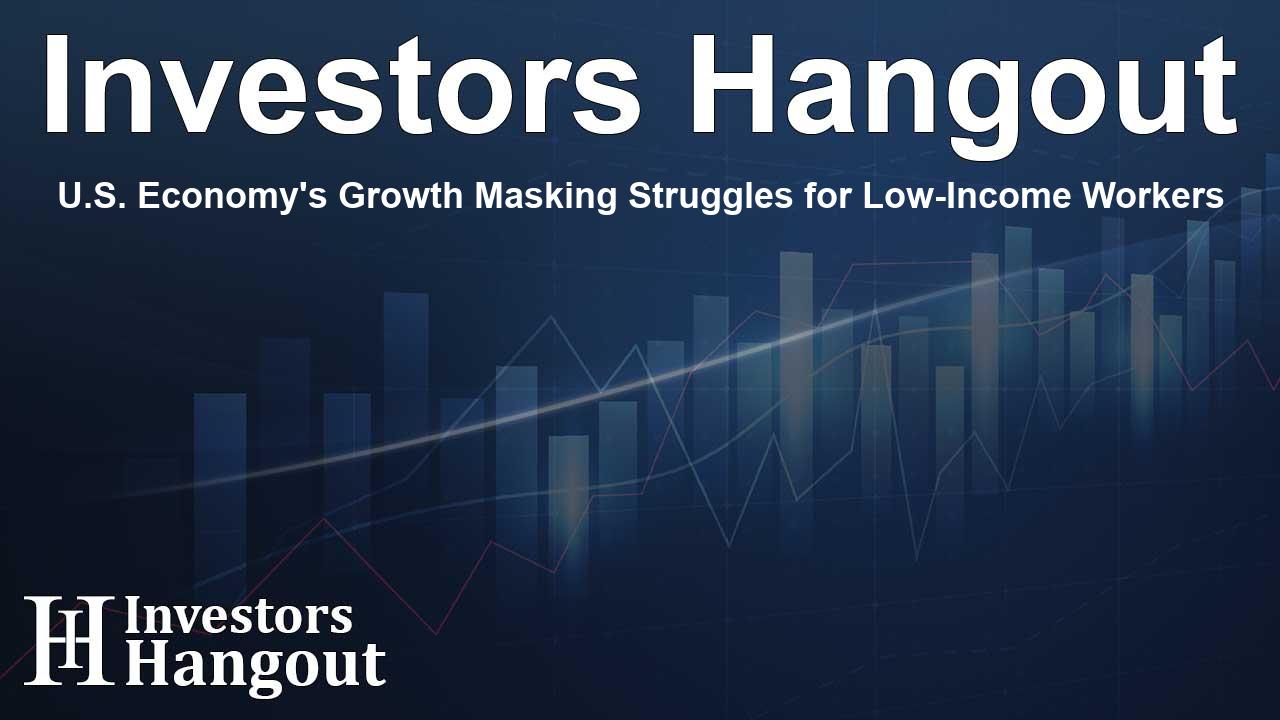U.S. Economy's Growth Masking Struggles for Low-Income Workers

Current Economic Growth and Its Disparities
Despite the U.S. economy reportedly growing by 3.8% last quarter and maintaining an unemployment rate of 4.3%, economists from Moody's (NYSE: MCO) have identified worrisome trends. According to their analysis, almost half of the states within the country are experiencing economic declines, raising alarms about an uneven growth landscape.
Pressure on Low-Income Households
In a recent interview, Chief Economist Mark Zandi revealed alarming statistics; there are 22 states where economies are contracting, in stark contrast to only 16 that are experiencing growth. While larger states, including California, Texas, and New York, continue to advance, they ironically contribute to masking economic difficulties being faced by many.
According to Zandi, “Lower-income households are hanging on by their fingertips financially.” They may have jobs, which allows them some engagement in the economy, yet the stability of that engagement feels increasingly precarious as companies are no longer hiring.
Shifts in Consumer Confidence
The Conference Board's U.S. Consumer Confidence Survey recently highlighted troubling findings, especially for those earning between $25,000 and $35,000 annually. This group reported diminishing feelings of economic optimism compared to earlier surveys, such as one conducted in April when the economy hit a low. Alarmingly, nearly 20% of participants expressed challenges in finding jobs, and 25% anticipated an even tougher job market.
Financial Struggles of Households
The economist emphasized that wage growth for those at the lower end of the income ladder is stagnating. Many are struggling with significant debt burdens related to auto loans, student loans, and mortgages, exacerbated by minimal savings. This scenario paints a bleak picture of financial health for many households.
In alignment with these observations, financial analyst Gordon Johnson voiced similar concerns about rising living costs. His commentary reflects the sentiment that many Americans are reaching a breaking point where life's basic expenses become unaffordable.
Challenges and Outlook
With the looming threat of persistent inflation, Fed Vice Chair Michael Barr noted that elevated rates may endure longer than initially expected. His insights suggest that the economic landscape may continue to challenge low-income families who are already struggling.
Effects of Tariffs and Policy on Economy
As the economic contraction is not uniform across the country, certain regions, especially in the Midwest, are facing particularly stark challenges. Zandi identified the District of Columbia as likely to see the steepest downturn due to federal layoffs and budget constraints, which also adversely impact surrounding areas like Maryland and Virginia.
Manufacturing, agriculture, transportation, and mining-dependent states are experiencing setbacks attributed to tariffs and stricter immigration policies from the previous administration. Georgia, which has a substantial manufacturing base along with significant agricultural exposure, has also felt the pinch of these economic pressures.
Additionally, JPMorgan Chase (NYSE: JPM) CEO Jamie Dimon recently issued a warning regarding the potential for recession as early as 2026, citing concerns about stubborn inflation that continues to affect consumers.
Frequently Asked Questions
What is the current state of the U.S. economy?
The U.S. economy is growing, but many states are experiencing contractions, highlighting significant disparities in economic performance.
Who is affected by the economic struggles?
Low-income households, particularly those earning between $25,000 and $35,000 a year, are facing increased financial pressure.
What are the main financial challenges faced by these households?
Many households struggle with auto debt, student loans, mortgages, and stagnant wage growth, leading to a tough financial situation.
What has the Conference Board's survey revealed?
The survey found that lower-income consumers have grown more pessimistic about the economy compared to previous lows.
What warnings have economists provided regarding the future?
Economists warn that persistent inflation may influence the economy for several years, potentially exacerbating the struggles of low-income families.
About The Author
Contact Henry Turner privately here. Or send an email with ATTN: Henry Turner as the subject to contact@investorshangout.com.
About Investors Hangout
Investors Hangout is a leading online stock forum for financial discussion and learning, offering a wide range of free tools and resources. It draws in traders of all levels, who exchange market knowledge, investigate trading tactics, and keep an eye on industry developments in real time. Featuring financial articles, stock message boards, quotes, charts, company profiles, and live news updates. Through cooperative learning and a wealth of informational resources, it helps users from novices creating their first portfolios to experts honing their techniques. Join Investors Hangout today: https://investorshangout.com/
The content of this article is based on factual, publicly available information and does not represent legal, financial, or investment advice. Investors Hangout does not offer financial advice, and the author is not a licensed financial advisor. Consult a qualified advisor before making any financial or investment decisions based on this article. This article should not be considered advice to purchase, sell, or hold any securities or other investments. If any of the material provided here is inaccurate, please contact us for corrections.
